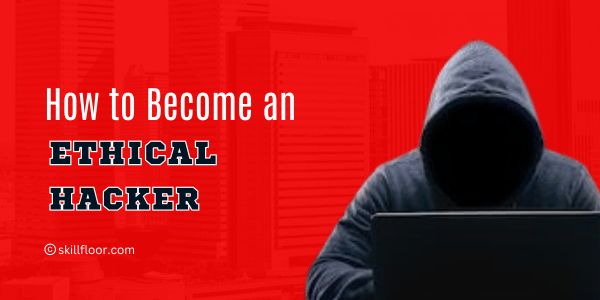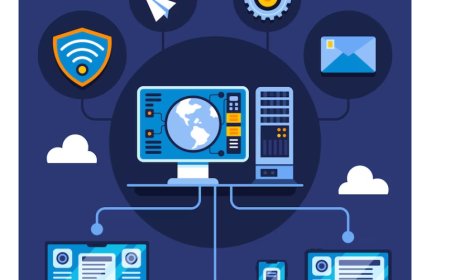How to Become an Ethical Hacker in 2025
Learn how to become an ethical hacker in 2025 with this step-by-step guide. Explore networking, certifications, tools, and tips for a thriving cybersecurity career.

Hacking is a world full of challenges, creativity, and constant learning. For me, the journey into ethical hacking has been more than just a career choice—it’s been an adventure that has changed my skills and mindset. By 2025, the demand for ethical hackers will continue to grow, and I want to share everything I’ve learned so you can step into this exciting field too. This guide will give you all the information you need to start and succeed.
What is Ethical Hacking?
Ethical hacking is the art of finding security flaws in systems, but with permission and good intentions. Unlike malicious hackers, ethical hackers (or white-hat hackers) work to protect systems instead of harming them. Their mission is to safeguard sensitive data by finding and fixing weaknesses before cybercriminals can exploit them.
For example, when a company asks an ethical hacker to test its network, the hacker tries to break in—just like a real attacker would. If vulnerabilities are found, they report and fix them to prevent future attacks. In simple terms, ethical hacking is about being proactive in securing digital environments.
What Does an Ethical Hacker Do?
Ethical hackers are cybersecurity heroes who use their skills for good. Here are some of the main tasks they handle:
-
Penetration Testing: This involves simulating attacks to see if a system can be breached.
-
Vulnerability Assessment: They scan systems for weaknesses, such as outdated software or weak passwords.
-
Incident Response: Ethical hackers help companies recover from cyberattacks and prevent them in the future.
-
Developing Security Solutions: They create strategies and tools to strengthen overall system security.
-
Training Teams: Sometimes, they also educate employees on best practices to avoid security breaches.
The role combines technical expertise, problem-solving, and creativity to stay ahead of cybercriminals.
Why Choose Ethical Hacking?
For me, becoming an ethical hacker has been an incredibly rewarding journey, and there are many reasons why this career is so attractive:
-
High Demand: Cyberattacks are rising, and organizations need experts to protect their data and systems. Ethical hackers are always in demand.
-
Lucrative Pay: Salaries for ethical hackers range from $90,000 to $160,000 or more annually, depending on your experience and skills.
-
Excitement and Challenges: Every project is like solving a new puzzle, and the work never feels repetitive.
-
Flexibility: You can work as a freelancer, consultant, or full-time employee, and many roles offer remote work options.
-
Making a Difference: You get the satisfaction of protecting people and organizations from serious harm.
Cybersecurity is one of the fastest-growing industries, and ethical hacking is a key part of it. If you’re curious and love challenges, this field could be perfect for you.
7 Steps to Become an Ethical Hacker
Becoming an ethical hacker requires a mix of technical knowledge, hands-on practice, and a solid understanding of the legal and ethical implications of hacking. If you're aiming to break into this field, follow these seven steps:
1. Learn Networking Basics
Networking forms the foundation of all hacking activities. Understanding how devices communicate across networks, and how data flows, is critical for any ethical hacker. Key concepts include:
-
IP Addresses: Understanding both IPv4 and IPv6 addresses.
-
Protocols: Knowing protocols like TCP/IP, HTTP, DNS, and FTP helps you identify vulnerabilities in communication.
-
Firewalls and VPNs: You need to understand how firewalls block or allow traffic and how VPNs secure network connections.
-
Network Layers: Learn about the OSI model, which divides network communication into seven layers, each with its own protocols and security risks.
Study books like Networking Essentials or Computer Networking: A Top-Down Approach to build your foundational knowledge.
2. Understand Operating Systems and Security
Operating systems are essential for hacking because most hacking tools and techniques are used within them. Linux, specifically Kali Linux, is preferred by many ethical hackers due to its range of built-in security tools. Key areas to focus on include:
-
Linux Commands: Knowing how to use the Linux command line is crucial for accessing system tools and performing tasks.
-
File Systems & Permissions: Understand how different OSes manage file systems, user permissions, and access controls.
-
Security Tools: Learn tools like Metasploit, Nmap, and Wireshark, which are widely used in penetration testing.
Start by installing Kali Linux or a similar distro and experimenting with its tools in a controlled environment.
3. Learn Programming and Scripting
Programming skills are essential for automating tasks and customizing tools, which can save time and improve efficiency in hacking tasks. Ethical hackers typically start with Python, which is easy to learn and has many libraries useful for security work. Once comfortable with Python, you can expand into other languages like:
-
C: Understanding how programs work at a low level and being able to identify vulnerabilities like buffer overflows.
-
JavaScript: For web application security and exploiting cross-site scripting (XSS) vulnerabilities.
-
Bash scripting: Automating tasks on Unix-like systems.
Learning how to code not only allows you to create custom exploits but also helps you understand vulnerabilities from the developer's perspective.
4. Practice in Safe, Legal Environments
While theory is important, ethical hackers need hands-on practice to refine their skills. Fortunately, there are many platforms that offer controlled environments for practicing hacking:
-
Hack The Box: A platform that provides virtual machines to practice penetration testing and exploitation.
-
TryHackMe: A beginner-friendly platform with guided lessons on various hacking topics.
-
CTF (Capture the Flag) Events: These are competitions where participants solve security challenges, often simulating real-world scenarios.
By using these platforms, you can gain real experience without breaking any laws.
5. Get Certified
Certifications provide validation of your skills and knowledge to employers and can be crucial for landing a job in cybersecurity. Some of the most recognized certifications in ethical hacking include:
-
Certified Ethical Hacker (CEH): This certification focuses on ethical hacking techniques and is offered by EC-Council. It covers topics like penetration testing, system hacking, and network security.
-
Offensive Security Certified Professional (OSCP): Offered by Offensive Security, this certification is hands-on and highly regarded in the industry. It requires you to compromise and exploit various machines in a simulated environment.
-
CompTIA Security+: This certification is often seen as an entry point into cybersecurity and covers broad topics such as risk management, encryption, and network security.
These certifications not only demonstrate your skills but also increase your credibility as a professional.
6. Learn the Legal and Ethical Aspects
As an ethical hacker, understanding the legal and ethical boundaries is just as important as your technical skills. Hacking without permission is illegal, regardless of your intent. To operate within the law, you need to:
-
Get Permission: Always obtain explicit permission before testing any system. Without it, your actions could be considered illegal.
-
Understand Cyber Laws: Familiarize yourself with laws like the Computer Fraud and Abuse Act (CFAA) in the U.S. or equivalent laws in other countries. These laws govern unauthorized access to computer systems and can carry severe penalties.
-
Adhere to a Code of Ethics: Many organizations and professional bodies have a strict code of conduct that ethical hackers must follow. This ensures that hacking is done for the benefit of improving security, not exploiting it for malicious purposes.
Ethical hackers must always act in good faith, with the goal of strengthening security and protecting users.
7. Stay Updated and Keep Learning
The field of cybersecurity is constantly evolving. Hackers are continually developing new techniques, and vulnerabilities are discovered daily. To remain effective, ethical hackers need to stay updated on the latest security trends, tools, and vulnerabilities. Ways to do this include:
-
Follow Blogs and Security Researchers: Many cybersecurity professionals and researchers share insights through blogs and forums.
-
Take Online Courses and Webinars: Websites like Skillfloor, Udemy, and Cybrary offer courses in cybersecurity and ethical hacking.
-
Attend Conferences: Conferences such as Black Hat, DEF CON, and RSA Conference provide an opportunity to learn from experts and network with others in the field.
-
Experiment with New Tools: New security tools and techniques emerge frequently. Experimenting with these tools in a lab environment is one way to stay sharp.
By continuously learning, you'll be able to keep up with the fast-paced, ever-changing world of cybersecurity.
How to Start With Zero Experience
When I started, I had no technical background, and it felt like an impossible dream. But I discovered that anyone can become an ethical hacker with the right approach:
-
Use Free Resources: Platforms like YouTube and free blogs offer great beginner tutorials on topics like networking and Linux.
-
Set Up a Virtual Lab: Use VirtualBox to create a safe environment where you can practice hacking techniques without risk.
-
Work on Small Projects: Try hacking your own devices or testing open-source software for vulnerabilities.
-
Take Beginner Certifications: Start with easy certifications like CompTIA Security+ to build your confidence.
-
Seek Internships: Many companies hire entry-level cybersecurity analysts, which can help you gain experience.
The key is to stay consistent and keep learning.
What Tools Do Ethical Hackers Use?
A good ethical hacker relies on the right tools. Here are some I use regularly:
-
Nmap: A tool for scanning networks and finding open ports.
-
Wireshark: Used to analyze network traffic and capture data packets.
-
Metasploit: An essential tool for testing system vulnerabilities.
-
Burp Suite: Great for checking the security of websites and web applications.
-
John the Ripper: A powerful password-cracking tool.
-
Hashcat: Another tool for testing password security.

Difference Between Ethical Hackers and Penetration Testers
Although these terms are often used interchangeably, they have slightly different meanings:
-
Ethical Hackers: Work broadly on improving overall system security and finding vulnerabilities.
-
Penetration Testers: Focus specifically on conducting controlled attacks to simulate real-world scenarios.
Both roles are important, but penetration testing is usually a subset of ethical hacking.
What Can You Expect in This Career?
As an ethical hacker, no two days are the same. One day you might be testing a company’s website for weaknesses, and the next day, you’re helping them recover from a ransomware attack. Here’s what to expect:
-
Typical Tasks: Penetration testing, vulnerability scanning, writing reports, and educating staff.
-
Dynamic Work: You’ll constantly face new challenges as cyber threats evolve.
-
Job Satisfaction: Knowing you’re making systems safer is incredibly rewarding.
How to Gain Experience
Experience is essential in ethical hacking, but how do you get it without a job? Here’s what worked for me:
-
Participate in CTF Events: Capture the Flag competitions are great for learning and networking.
-
Freelance Bug Bounties: Platforms like HackerOne let you earn money by finding security flaws in real systems.
-
Contribute to Open-Source Projects: Help test or develop cybersecurity tools.
-
Create Personal Projects: Write scripts, build your own hacking tools, or simulate attacks in your lab.
What is the Job Outlook for Ethical Hackers?
The future looks incredibly bright for ethical hackers. As cyberattacks grow more sophisticated, companies are scrambling to hire skilled professionals. By 2025, cybersecurity roles are expected to grow at double the rate of other fields. If you keep learning and improving, you’ll never run out of opportunities.
Final Thoughts
Becoming an ethical hacker is about more than just learning tools or techniques—it’s about adopting a mindset of curiosity and responsibility. This career offers the thrill of constant challenges, the satisfaction of protecting systems, and the financial rewards of working in a high-demand field.
If you’re ready to take the first step, dive into networking, set up a lab, and start practicing. Everyone starts somewhere, and I truly believe anyone can become an ethical hacker with dedication and persistence. By 2025, you could be one of the people keeping the digital world safe.






























































